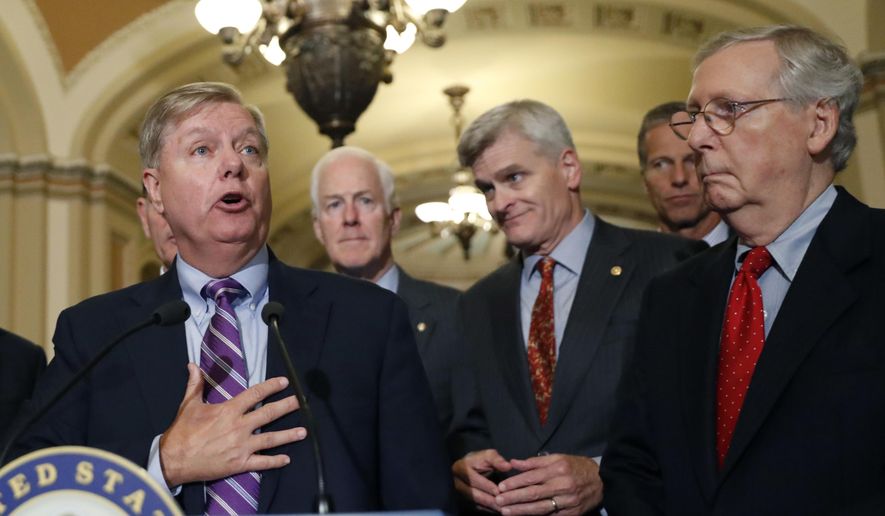Senate Republicans revised their last-ditch Obamacare Monday in an 11-hour bid to win over key holdouts, after prospects of passing a repeal bill dimmed significantly over the weekend.
An analysis released by Sen. Bill Cassidy, Louisiana Republican and lead sponsor, said bill-writers turned the dials enough to give states such as Alaska and Maine an overall boost in funding through 2026, after independent analyses suggested those states would lose out under the initial bill.
It’s unclear if independent analysts will agree with the data calculated by the Health and Human Services Department.
The changes would also give states a freer hand to offer skimpier plans by redefining what insurers must cover, after key conservatives said they hadn’t gotten to “yes” yet.
Mr. Cassidy and his main co-sponsor, Sen. Lindsey Graham of South Carolina, are doing everything they can to try and win over reluctant Republicans by Saturday, when budget instructions allowing the GOP to avoid a filibuster will expire.
Under the plan, money currently being used to subsidize Obamacare customers and expand Medicaid in parts of the country would be pooled together and siphoned back to the states as block grants.
Republican Sens. Rand Paul of Kentucky and John McCain have said they will vote against the proposal, while Sen. Susan Collins of Maine said it will be “very difficult” for her to back it. GOP leaders cannot afford to lose more than two senators from their 52-seat majority.
Mr. Paul’s spokesman, Sergio Gor, said the latest changes weren’t enough to win over the senator, who is demanding three changes to get to “yes”: The plan must significantly slash spending compared to Obamacare, waive the 2010 law’s insurance regulations so that states must opt back into them and let workers band together and buy “association” plans across state lines.
Sen. Lisa Murkowski of Alaska is another tough sell, though sponsors are hoping they can win over at least two of the four holdouts by sweetening the bill for their states.
President Trump sounded pessimistic during a radio interview on Monday.
“Looks like Susan Collins and some others will vote against,” Mr. Trump told the “Rick & Bubba Show” in Alabama. “So we’re going to lose two or three votes, and that’s the end of that.”
Under the new plan, Alaska would see a 3-percent boost over the coming decade, Maine would get 43-percent more. Arizona and Kentucky see get increases of 14 percent and 4 percent, respectively, according to Mr. Cassidy’s table.
“Alaska, Arizona, Maine and Kentucky are big winners in the Healthcare proposal. 7 years of Repeal & Replace and some Senators not there,” Mr. Trump said on Twitter late Sunday.
Critics said the new figures were misleading, because they incorporated “state savings” from no longer requiring states to contribute their share of funding for Obamacare’s Medicaid expansion. The cut in federal dollars is what matters, they say, and states like Alaska are still projected to lose out over time.
Efforts to win over certain senators with more money could turn off other Republicans, however, and the holdouts’ concerns go beyond funding.
Mr. McCain opposes the bill because it appeared to be rushed and partisan, while Ms. Collins and Ms. Murkowski have also criticized the process and parts of the bill that appeared to let insurers charge sicker customers more than healthy ones in states that allow it.
Sen. Ted Cruz, Texas Republicans, said Sunday he isn’t ready to vote for the plan, either, and that Republican Sen. Mike Lee of Utah shared his concerns. Both senators are conservatives who’ve pushed to kill off Obamacare’s regulations on insurers, arguing they sent rates skyward.
The latest version of the bill empowers states to set their own benefits standards instead of getting permission from the federal government to tweak what insurers must cover, such as mental health and maternity care.
States can apply to let insurers charge sicker people more than healthy ones under the bill, yet must provide a description of “how the state shall maintain access to adequate and affordable health insurance coverage for individuals with pre-existing conditions.”
Senate Minority Leader Charles E. Schumer said the latest edition of “Graham-Cassidy” is still too draconian.
“Despite an attempt to appear to add money for a select few states, this bill is just as bad for those states and the rest of the states because it still contains a massive cut to Medicaid, and would throw our health insurance system into chaos while raising premiums,” the New York Democrat said. “It still takes away protections for those with preexisting conditions and further weakens consumer protections.”
Senate Republicans are forging head, however. The Congressional Budget Office is expected to release topline figures on the bill’s fiscal impact later Monday, while the Senate Finance Committee holds the first and — and likely only hearing — on the bill before potential votes this week.
A long line of protesters, many of them in wheelchairs and matching T-shirts, crowded the hall outside the hearing room hours before it gaveled in.
“You are the faces of political change in America,” Sen. Ron Wyden, the panel’s ranking Democrat, said as he handed out pizza to the crowd. “You can’t win a big battle against the special interests on an empty stomach.”
Recent surveys suggest the GOP bill is unpopular. A CBS News poll found 52 percent of Americans disapprove of the effort, while only 20 percent approve.
• Tom Howell Jr. can be reached at thowell@washingtontimes.com.




Please read our comment policy before commenting.